Tutorial:Tripwire techniques
This tutorial lists some techniques practical for tripwire circuits in Java Edition, especially tripwire hook duplicators.
Block state control
This section uses tables resembling those in Tutorials/Block and item duplication.
Hook
Unstable hook
This section shows how to place a tripwire hook on a block that it should not stay on.
Prior to 17w47a, the tripwire block next to the unstable hook can update it, so do not trigger or let anything trigger this tripwire block after obtaining the unstable hook.
Current
| Method | Java version range | Mod patched? |
|---|---|---|
| TNT | 1.12-pre1 and later | Paper ~1.17[1], Carpet Fixes |
| Door | 19w13a and later | Paper ~1.17[1], Carpet Fixes |
After calculating the states of the tripwire circuit, a tripwire hook (usually on the west or south of the circuit, referred to as the active hook, the opposite hook as the passive hook) sets the passive hook, and then sets itself. This method includes placing the active hook on TNT or a door on a trapdoor, and priming the TNT or breaking the door when the passive hook is set through redstone wire, so that the active hook is placed on air.
The previous active hook drops as an item. Prior to 17w47a, beware of it triggering adjacent tripwire. Besides, be careful when using TNT.
The schematics work when tripwire is triggered.
Outdated
| Method | Java version range | Mod patched? |
|---|---|---|
| Stairs | 17w18a and 17w18b | No |
| Observer | 19w13a to 20w09a | No |
Stairs
In 17w18a and 17w18b, tripwire hooks placed on stairs are unstable. If you need an unstable hook in a tripwire circuit, residual-connect the tripwire before placing the hook to prevent the adjacent tripwire block to update the unstable hook when becoming attached.
Observer
Place a hook on a moving piston block of an activated observer. The tripwire hook becomes unstable after the observer arrives, and it does not update the hook.
Since 20w10a, tripwire hooks on observers are stable.
Wire
Overpowered tripwire
| Method | Java version range | Mod patched? |
|---|---|---|
| Player breaking | 14w25a to 1.8-pre2; 17w47a to 1.21.1 | Forge and China Edition ~1.16.5[2], Paper ~1.18.2[3], Carpet Fixes |
| Water breaking | 14w25a to 24w35a | Paper ~1.18.2[3], Carpet Fixes |
These tripwire blocks have block states powered as true and disarmed as false, and have no scheduled tick. They always signal (not updating) tripwire hooks in the same tripwire circuit.
When being broken, a tripwire block updates its active hook faking as a triggered tripwire block. If the hook calculates an attached state inconsistent with its own, it sets that state for all blocks in the tripwire circuit, placing the fake triggered tripwire out. Then if the tripwire has no scheduled tick, it never becomes unpowered.
To obtain overpowered tripwire, you can break two tripwire blocks in a tripwire circuit from east to west or from north to south within 10 game ticks. Selectively triggering powerless tripwire helps to keep the tripwire circuit unattached. Most tripwire duplicators also produce overpowered tripwire.
Powerless (sheared/disarmed) tripwire
| Method | Java version range | Mod patched? |
|---|---|---|
| Player breaking | 14w25a to 1.8-pre2; 17w47a to 1.21.1 | Forge and China Edition ~1.16.5[2], Paper ~1.20.4[4], Carpet Fixes |
| Other possible methods | 14w25a to 24w35a | Paper ~1.20.4[4], Carpet Fixes |
These tripwire blocks have block state disarmed as true. Most are powered, excluding those having a scheduled tick when being sheared.
Sheared tripwire never signals tripwire hooks. When a sheared tripwire block in a connected tripwire circuit is broken, the circuit becomes disconnected immediately, resetting the tripwire block. This allows switching the connected state of a tripwire circuit without cutting if off completely.
Tripwire is usually disarmed by breaking with shears in a connected tripwire circuit. For versions not supporting this operation, there are advanced methods[5] and mods[6][7] as alternatives, and you can also temporarily enter the world in a supportive version to shear tripwire (remember to backup).
On the other hand, in order not to cut off the sheared tripwire, shearing tripwire requires a very short click, which is sometimes difficult. Here are methods to avoid cutting off sheared tripwire.
Selective reset
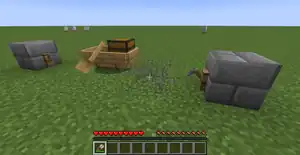
Apply selective triggering to tripwire other than the tripwire block to shear in the same tripwire circuit. It resets the tripwire circuit after shearing. Each selectively triggered tripwire block increases 1 game tick of tolerance for shearing.
Using door
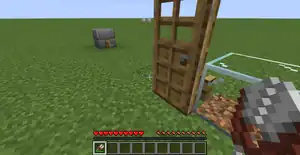
This method includes keeping the tripwire circuit triggered and placing a door next to one of the tripwire hooks that blocks you when closed.
Gapped tripwire
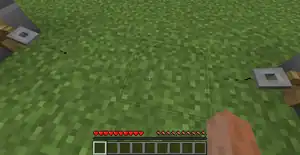
| Java version range | Mod patched? |
|---|---|
| 17w47a and later | ? |
A tripwire block in a connected tripwire circuit may not connect to the adjacent tripwire block on its west or south, leaving a gap. While the west hook is setting the attached state of tripwire from west to east for reasons other than gapped tripwire being broken, the gapped tripwire transmits a PP update from the tripwire block on its west to its position before it spreads to the other directions, and does not affect NC updates. This can be used to control the sequence of scheduled ticks of water sources and waterlogged blocks updated by tripwire.
A gap forms in a tripwire block when placement of another tripwire block on its west or south makes the whole tripwire circuit connected, and vanishes when the adjacent tripwire block that the gap faces is triggered or sheared. An overpowered tripwire block can protect an adjacent gap from being destroyed by an entity triggering the tripwire.
Both
Residual connectivity
| Method | Java version range | Mod patched? |
|---|---|---|
| Inserting | ~1.3.1 and later | ? |
| Placing | 19w13a and later | ? |
Tripwire hooks and tripwire blocks may be still attached when the tripwire circuit is disconnected, and the hooks do not deactivate if activated. Such tripwire hooks can serve as power sources.
Inserting third hook
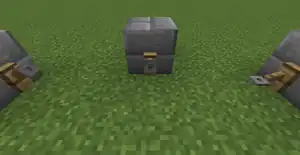
Break a tripwire block in a connected tripwire circuit and insert a third tripwire hook there within 10 game ticks. The tripwire hook and tripwire blocks east or north to the third hook do not become unattached.
Placing hook
Place a tripwire hook to complete a tripwire circuit with tripwire triggered and the opposite hook on a closed door. The opposite hook drops, while the placed hook and all the tripwire are still attached.
Timing control
Periodically triggering
This section shows methods to periodically trigger tripwire and obtain periodic signals from tripwire hooks, which is useful for tripwire hook duplication. Besides these methods, tripwire duplicators are also useful for this.
Minecart
This feature can only be accessed through the "Minecart Improvements" experimental data pack in Java Edition.
Every 10 game ticks, tripwire triggered by a minecart performing its movement at a higher position deactivates and is immediately triggered again, producing a 0-tick off-pulse at the hooks.
Crawling
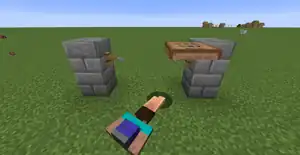
When tripwire is not triggered, the player triggers it. When it is triggered, a trapdoor makes the player crawl in order not to trigger the tripwire.
Lava
Let lava flush powerless tripwire. It generates a falling edge every 30 or 10 game ticks, 10 game ticks after which a rising edge generates from execution of a scheduled tick of the active hook. You can add more lava flowing at different phases to produce more edges.
Selectively triggering powerless tripwire
Tripwire sheared while being triggered by an entity can still detect entities, and generates a 0-tick on-pulse every 10 game ticks when selectively triggered, opposite to most of the other methods.
Player pushed by water
A player pushed against a full block by water triggers tripwire above the player every 10 game ticks, similar to minecarts.
Selective triggering
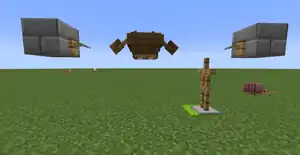
A tripwire block has a larger hitbox when not attached. Entities in some positions only trigger it when it is not attached. Entities elevated over tripwire by a block with a height from 0.1875 to 0.4375 are included. Trapdoors are commonly used, requiring attention not to activate them.[8][9][10] Among entities boats are commonly used because they are cheap yet big enough to selectively trigger 3 tripwire blocks. Another choice is an armor stand on a carpet two blocks lower.[11]
Make sure the tripwire block is not triggered when generating a rising edge by selective triggering. Thus, a tripwire block needs to cool down for at least 10 game ticks after being triggered.
Water flushing close loop
These devices make water flush tripwire only when it is activated or inactivated, mainly used for tripwire duplicators
Upstream (shower) control
These use trapdoors that block water from flushing tripwire when it should not.
Downstream (well cover) control
These prevent water from flushing tripwire by covering or uncovering a pit for water to flow toward. Make sure to waterlog the "well cover". Making water flush when tripwire is activated, be sure to have another pit for water to flow toward when the well cover is closed.
-
 Flushing when activated.
Flushing when activated. -
 Flushing when inactivated.
Flushing when inactivated.
References
- ↑ a b https://github.com/PaperMC/Paper/commit/4d2258#diff-b2e16d01f3fbc64b629a9ff79993c4a04c3e199bd4f5ad74aa2535b6fe8b56dd
- ↑ a b https://github.com/MinecraftForge/MinecraftForge/commit/1406f2
- ↑ a b https://github.com/PaperMC/Paper/commit/d0b8b1e
- ↑ a b https://github.com/PaperMC/Paper/commit/55ffcb1
- ↑ https://www.bilibili.com/video/BV1Sk4y1i77A
- ↑ https://www.bilibili.com/video/BV1ra4y1d7uL
- ↑ https://github.com/mcmaidong/DontCutTripwire
- ↑ https://www.bilibili.com/video/BV18N411d7ro
- ↑ https://www.bilibili.com/video/BV1mo4y1N7Sk
- ↑ https://t.bilibili.com/722657779911753826
- ↑ https://www.bilibili.com/video/BV1Vy4y117Ri